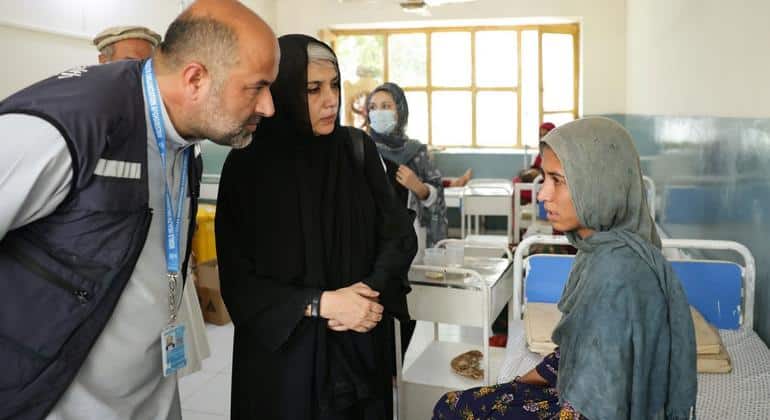Sure! Here’s the translation to American English:
The life of Dr. Abdul Mateen Sahak took an unexpected turn on the night of last Sunday, when a magnitude 6.0 earthquake struck eastern Afghanistan, affecting Jalalabad, his place of residence, particularly hard. On that fateful night, as he and his wife got out of bed, they found their eight children waiting for them in the hallway, visibly terrified by the looming disaster. Aware of past tragedies, like the devastating earthquake that hit Herat in 2023, Dr. Sahak knew from the very first moment that the situation could be destined to repeat itself.
As the director of the local emergency office of the World Health Organization (WHO), his priority was to activate the crisis response immediately. He quickly joined the WhatsApp group of his health network to coordinate efforts. The first reports that began to flow were alarming, especially from Asadabad, where the earthquake’s impact had been devastating. As the hours passed, reports of the injured began to multiply, reflecting the magnitude of the tragedy.
The arrival of the monsoon further complicated the emergency response. As Dr. Sahak and his team prepared, the rains began to fall, making transportation and helicopter landings difficult. Nevertheless, they managed to send 23 tons of medical supplies to Nurgal district, the epicenter of the quake.
Upon arriving in Nurgal, the scene they encountered was desolate: streets filled with rubble and a rising number of victims. The drastic increase in the death toll and injuries left Dr. Sahak in shock. The stories of survivors were heart-wrenching. One man he met had lost 22 family members in the disaster, while a severely injured woman cried out for her baby, whom she had lost in the tragedy.
The situation was particularly critical for women, who, due to gender restrictions in Afghanistan, faced barriers to accessing medical assistance. However, the earthquake managed to temporarily break down some of these norms, allowing men and women to collaborate in rescue and medical care efforts.
As the days passed, the WHO, under Dr. Sahak’s leadership, continued to establish emergency clinics and distribute supplies. However, the challenge became even more complicated by the imminent spread of diseases, as drinking water and sanitation systems were severely affected. The WHO requested $4 million to operate in this emergency and ensure that mobile health services remained active.
On a personal level, the impact of the tragedy resonated in his home. His mother, upon embracing him after his return, urged him not to go back to the affected areas, but Dr. Sahak was aware that the assistance provided was essential. With courage and dedication, he said goodbye to his family, promising to return to help those in need, maintaining his commitment to saving lives amid a scene of devastation.
via: MiMub in Spanish










